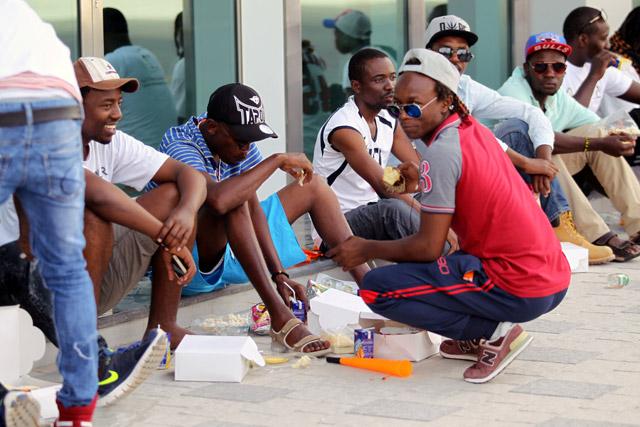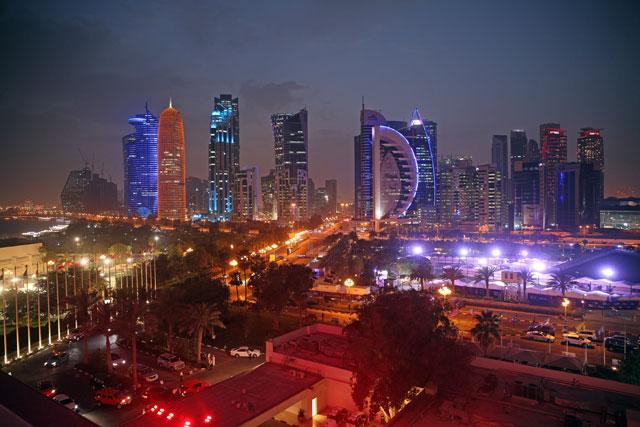You are here
Arab boycott adds to woes of Qatar migrant workers
By Reuters - Aug 15,2017 - Last updated at Aug 15,2017

Migrant workers have food during a celebratory event before the final football match between Taleb Group and Gulf Contracting at Qatar Workers Cup in Doha, Qatar, May 6, 2016 (Reuters file photo)
DOHA — An Arab embargo on Qatar is inflicting pain on foreign migrant workers struggling amid an oil slump and disruption of deliveries for large construction projects linked to the 2022 soccer World Cup.
Saudi Arabia, Egypt, Bahrain and the United Arab Emirates (UAE) imposed sanctions on fellow US ally Qatar in June and cut all transport links with the country, accusing it of supporting terrorism, a charge Doha denies.
To get around the boycott Qatar has flown in food from Turkey and Iran and chartered ships via Oman to bring in construction materials needed for World Cup projects.
But the feud is making life harder for some foreign workers in Qatar, already faced by layoffs caused by low oil prices and a work-sponsorship system that restricts their movement.
Fresh vegetables usually trucked across Qatar's land border with Saudi Arabia, a route now blocked, have increased in price.
That is indebting some workers from places like India and Nepal who typically earn 800 rial ($219.78) a month and who make up about 90 per cent of Qatar's 2.7 million population.
South Asian workers have been left stranded on Qatari farms in Saudi Arabia without food after their Qatari employers fled to Doha in June, according to a Human Rights Watch report.
Last week dozens of Indian and African workers at hotels in Doha were told to take extended unpaid leave and return to their countries because of a drop in occupancy caused by the embargo.
"Our rooms were filled with Saudis on weekends but they don't come to Qatar any more. We can't have workers cleaning empty rooms," said a Doha hotel manager, declining to give his or his company's name.
Salaries delayed
Qatar has denied reports of lower hotel occupancy rates and said its preparations for the World Cup have not been affected.
The tiny Gulf state's economy, buoyed by vast natural gas reserves, can weather years of sanctions, officials say.
But any pause in the flow of construction materials could delay projects and leave migrant workers vulnerable to exploitation, said Gulf labour researcher Mustafa Qadri. "The impact could reverberate to South Asia, the Philippines and East Africa where migrants' families depend heavily on remittances."
At an Indian restaurant near Doha's airport on Monday, Japesh Afsal, a waiter serving fish curry to labourers, said rising prices had hurt business. "Fish prices are up. If we raise our prices this will be hard for customers," he said.
Raji, a Bangladeshi crane-operator, said his manager told him that his pay could be delayed next month because the company was running out of steel, previously imported from the UAE.
A work-sponsorship system widely enforced in the Gulf and known in Qatar as "kafala" requires foreign workers to get their employer's consent to change jobs or leave the country. Qatar says it has ended kafala but some migrants still work without proper access to water or shelter from sun, rights groups say.
The crisis may bring change. On Wednesday, Qatar announced a plan to allow Indians and dozens of other nationalities to enter Qatar on arrival without a visa.
Qatar's emir in a rare public address last month thanked the country's foreign residents for their contributions.
"Foreigners built this country. Qatar knows it cannot survive without them," said Marie Trichia, a barista at Doha's Gate Mall.
Related Articles
Qatar has said it will push ahead with reforming its controversial "kafala" labour system, which critics have likened to modern-day slavery, without giving a timetable for when this will happen.
DOHA, Qatar — Qatar on Saturday said it will introduce a labour panel to assess grievances by migrant workers later this month, a major refo
DOHA — Boxloads of wooden camels, plates with pictures of Qatar's skyscrapers, gold necklaces, football hats and scarves arrive every day in















